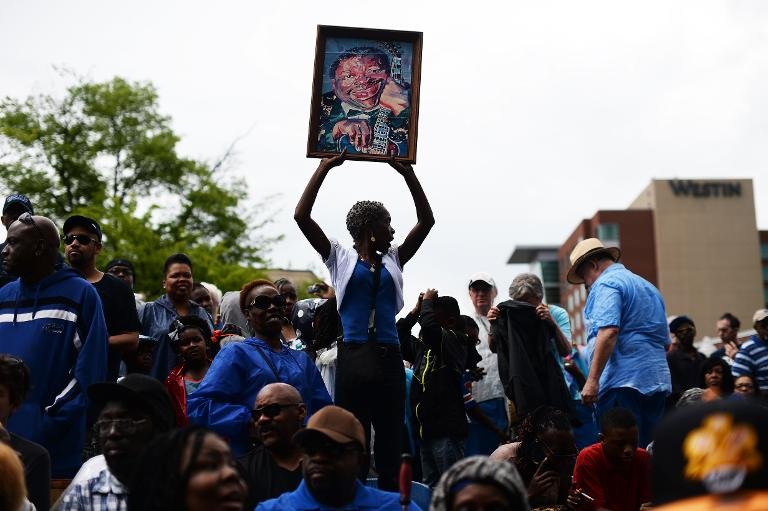Memphis pays final tribute to blues legend B.B. King

Memphis (AFP) – The city where B.B. King got his musical start paid final tribute to the blues guitar master Wednesday, as thousands walking in the rain with his hearse shouted, “long live the king!”
The procession moved down a historic thoroughfare — Beale Street — the downtown strip famous for its blues clubs and source of King’s showbiz name.
“He’s going back home, to this place where, back then, black musicians had a hard time thriving,” said Carver Randle, a longtime friend of King, who died May 14 in Las Vegas at the age of 89.
King would move on to become a living legend the world over, with the stature of a Memphis local named Elvis Presley.
But King’s ties to Memphis never faded.
“B.B. King and Memphis had a long time love affair,” said Mayor A.C. Wharton.
As the procession moved forward, people remembered “the king” emotionally.
“I felt like we lost our grandfather,” said marcher Kate Hacket, amid the crowd blending young and old, men and women, blacks and whites.
At the head of the procession was a Gibson guitar given the name Lucille, just like all the others King accumulated over the course of his 60-year career.
A band played “When The Saints Go Marching In,” as the mourners proceeded down Beale Street.
– ‘Medication for the soul’ –
After getting his start in its clubs, King became known as the “Beale Street Blues Boy,” which eventually became B.B. King. His real name was Riley B. King.
The street is no longer what it was in its glory days, but has not abandoned its past altogether. In the evening you can still catch a blues show.
“It was like the New York of the 50s. If you could make it on Beale Street, you could make it anywhere. B.B. King was the symbol of this era,” said Jayne Ellen White, of Memphis’ famed Sun Studio, where King, Muddy Waters and Elvis recorded albums.
King was born in poverty in Mississippi and worked cotton fields for a pittance. For many, he represented the suffering of blacks in the Deep South during the segregation era.
“The music of B.B. King is like a medication for the soul. It tells me that I’m not the only one who suffers,” said Alexander Hamilton Warner, a black Memphis native in his 60s.
Wednesday’s tribute almost didn’t happen. An autopsy had to be carried out this week on King’s body in Nevada after two of his daughters alleged he had been poisoned by his business manager.
King suffered from Type II diabetes for the last two decades of his life. During his career he kept up a grueling schedule of tours that ended only last year.
But the poisoning controversy seemed lost on the people celebrating King’s life and music on Wednesday.
“It happened with Michael Jackson and Elvis Presley. There are always controversies when legends die. We’d better wait, and mourn him,” said Alvin Long, another local.
Rather, people had another worry on their minds: will the blues fade away with the death of ambassadors like King?
“This is a part of my childhood that goes away. This was the music my parents listened to. I hope we’re not going to lose the blues,” said Darlene Buler, who is originally from Mississippi.
But Morris Hardaway, who traveled to Memphis from California to attend Wednesday’s tribute, insisted the blues will in fact live on.
“In 100 years, there will always be someone in the world who will want to sing the blues to tell of his pain, his money issues or to cry over the wife that just left him,” Hardaway said.
After the march, King’s coffin was symbolically pointed in the direction of Mississippi, the birthplace of the blues, where King was born and will be buried on Saturday.
Join the conversation about this story »
![]()
SOURCE: Business Insider – Read entire story here.